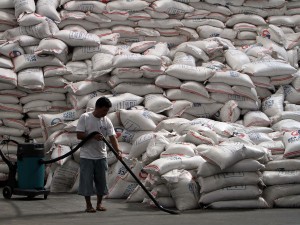A group of leading economists and sociopolitical thinkers has called on the Aquino administration to abandon what it deemed as a “costly, impractical and discredited” rice self-sufficiency policy and has sought the abolition of the monopoly of the National Food Authority (NFA) on rice importation.
In a statement, the Foundation for Economic Freedom (FEF) said reforms in the country’s policy on rice procurement were necessary to “improve the welfare of consumers, to foster agricultural growth, to reduce graft and corruption and truly implement ‘Daang Matuwid’ (righteous path).”
The FEF said there was also a need for the Philippines to abolish import quotas on rice, adhere to the country’s commitments to the World Trade Organization (WTO) and desist from subsidizing the losses of NFA from the pockets of consumers.
The group noted that the government had failed to achieve its much ballyhooed target of rice self-sufficiency in 2013.
“NFA is scheduled to import some 1,000,000 metric tons of rice this year, a blatant admission of the failure of the government’s rice self-sufficiency policy. Instead, the demands of the market have been met by smuggled rice, which deprives the government of much-needed tax revenues, and imports by favored dealers of the NFA, leading to suspicions of graft and corruption,” FEF said.
The group likewise noted that the government’s continued reliance on import quotas to attain declared rice self-sufficiency has led to escalating prices of rice, which has made the staple less affordable to millions of poor Filipinos. Dean of the UP School of Economics and agricultural economist Ramon Clarete estimated that the domestic price of rice was about 40-percent higher than imported rice, a huge penalty being paid for by consumers.
By limiting the amount of rice that could be imported into the country through import quotas, the group said the government was violating its commitments to the WTO, which it noted was a view shared by the Department of Justice. The group warned that the country was at risk of being penalized by the WTO, adding to the high costs of maintaining quantitative restrictions in rice importation.
“We in the Foundation for Economic Freedom believe that we should focus on income and food security and not rice self-sufficiency. We can achieve food security through trade, just as Malaysia has done. Instead of government incurring huge losses in subsidizing NFA, it should channel the funds to rural infrastructure or increased budgets for agricultural research and development,” the FEF said.
The group also argued that the rice imported by the NFA did not find their way to the poor but “are being channeled by favored enterprising importers to the commercial market.” It said that NFA losses were an inefficient way to help the poor.
“Since NFA’s decisions to import are arbitrary, these decisions to import rice end up hurting our rice farmers, who can’t guess when they should plant more or less rice,” the group said.
FEF, a public advocacy organization embracing economic and political liberty, good governance as well as market-oriented reforms and consumer protection, is led by former finance secretary Roberto de Ocampo as chair, former finance undersecretary Romeo Bernardo as vice chair and Calixto Chikiamco as president. Other trustees included Monetary Board member Felipe Medalla, Education Undersecretary Francisco Varela, former presidential adviser for strategic projects Gloria Tan-Climaco, former deputy spokesperson for economic affairs Gary Olivar and investment banker Simon Paterno.
